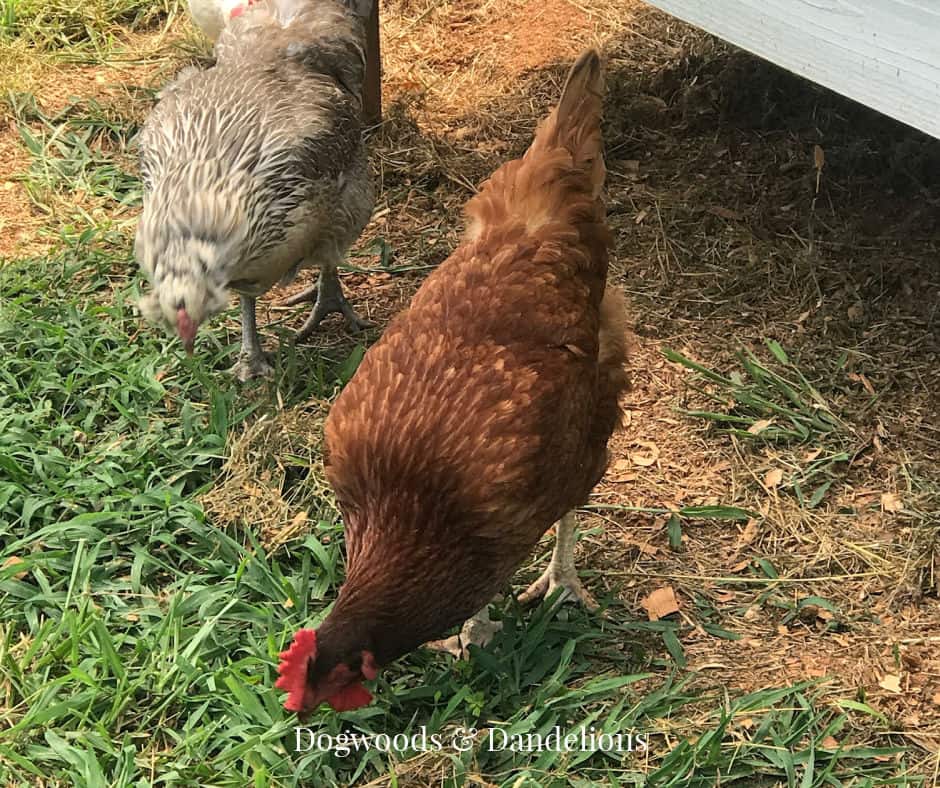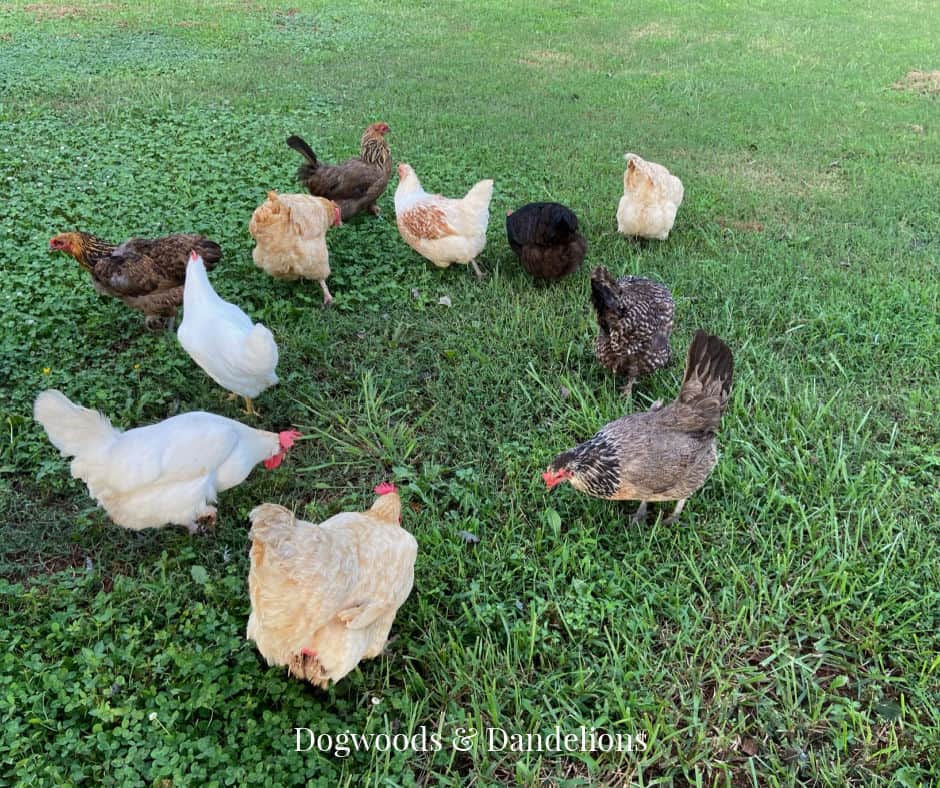What Is Grit for Chickens?
Inside: Learn what is grit for chickens and do you really need to use it with your flock.
Many new chicken keepers often forget to think about grit for their chickens. But is grit necessary for a healthy flock? How do you provide grit for chickens? Do you know what type of grit to provide and when should you give your chickens grit? Let’s explore these topics so you can feel confident in your choice of grit.
What Is Grit? And Why Do Your Chickens Need It?
Grit is defined as any small stones or pebbles that your chickens will pick up while they are pecking around.
To understand why chickens need grit, you must first understand a bit about a chicken’s digestive tract. Chickens don’t have teeth. They swallow foods whole.
For digestion, a chicken has a gizzard. A chicken’s gizzard is a thick, muscular wall of a chicken’s stomach that’s function is to grind up the food a chicken eats to turn the nutrients from the food into a usable form the chicken can use. The gizzard acts like teeth.

Affiliate Disclosure: Please note that some of the links in this article may be affiliate links and I may receive a small commission if you purchase something through a link. It will not change your cost. As an Amazon Associate, I earn from qualifying purchases. For more information, see my disclosures page.)
For more information on how a chicken’s digestive system works, check out this article from Nutrena.
The grit remains in the bird’s gizzard to grind up their food. However, over time, the grit eventually gets ground up too. So chickens need access to more grit quite frequently.
If a chicken doesn’t get the grit it needs, its food may not get ground up properly. Therefore the chicken may not get the necessary nutrients it needs.
Do My Chickens Need Grit?
If you only feed your chickens commercial poultry feeds your chickens don’t necessarily need grit. They should be able to digest layer pellets or crumbles just fine without it.
But the majority of backyard chicken keepers like to spoil their flock a bit. If you provide your chickens with kitchen scraps or scratch, (anything other than layer feed) then you will need to provide supplemental grit.
Do Free Range Chickens Need Grit?
Many chicken keepers who have free-range chickens do not provide additional grit. They feel that their chickens will naturally pick up enough small rocks while foraging in the yard.
However, if your flock doesn’t have a large area to free-range in, they may need chicken grit to ensure they can find enough.
I personally think it is a good idea to provide a source of grit anyway. If you provide it free-choice, your flock will generally take what they need without consuming too much grit.
A bag of grit in inexpensive and will last quite a while. I would much rather provide my backyard chickens with a source of grit than worry they aren’t finding enough.
2 Types of Grit
There are two different types of poultry grit – soluble and insoluble. Your adult chickens need both!
Insoluble Grit
Insoluble grit is often called flint grit or granite grit. It is made from granite or flint and needs to be the right size for your chickens. Any grit that is too small, will pass through the chicken’s digestive system without staying in the gizzard.
This is the type of grit that will grind up whatever your chickens eat to break down the food and provide the nutrients your flock needs. Lack of grit can prevent healthy digestion of food particles and can lead to sour crop.
If you are offering young chicks kitchen scraps or they are free-ranging part of the day, you should have small size grit available free choice to provide good digestion of any bugs and grasses they eat.
Soluble Grit
Soluble grit is grit that will dissolve in the chicken’s digestive system. It is often referred to as mineral grit.
The most common type of soluble grit is oyster shell. This provides your laying hens with extra calcium in the form of calcium carbonate to make strong eggshells.
Soluble grit can serve double duty. It provides your hens with additional calcium to keep their eggshells strong but can also help with grinding up the food. However, it doesn’t remain in a chicken’s digestive system as long as insoluble grit, so I prefer to offer both to my flock.
Roosters don’t need soluble grit at all and older hens who aren’t laying typically don’t need additional oyster shell either. And young chicks don’t need soluble grit until they start laying eggs.

Best Practices for Offering Grit to Your Chickens
The best way to offer grit to your flock is to offer your flock free access to both oyster shell grit and insoluble grit. This means having a bowl or separate feeder of grit available at all times. We keep a separate bowl of both out for the chickens to access whenever they need it.
Offering it free-choice allows your flock to take what they need, without getting too much. It is a good idea to offer both types in separate containers.
Don’t mix grit in with your chicken feed. When mixed into the food, your chickens might take in more than they need. Too much soluble grit can lead to kidney damage.
If offered free-choice, your roosters won’t bother the soluble grit, but the laying hens that need the additional calcium can take what they need.
Grit for Chicks
If you have baby chicks, be sure to purchase grit specifically for them. If they are only eating chick starter, (no food scraps and no free-ranging) you don’t need to provide additional chick grit.
And for baby chicks, only provide insoluble grit. Baby chicks don’t need oyster shell with the additional calcium until they start laying. Providing too much calcium is as bad, if not worse, than not providing enough calcium.
One study found that adequate grit can increase egg production and decrease food consumption. While providing grit will probably not make a noticeable difference in either of these, we always want what’s best for our flock so they will be healthy and happy.
While many backyard chicken keepers have never heard of grit, it is a good idea to provide supplemental grit to most chickens in a separate container from their food. It isn’t expensive and will help ensure the health and well being of your flock.
Related Posts
- When is it safe to move your chicks from the brooder to the coop?
- 9 Foods you should never feed your chickens
- Why you may want to free-range your chickens (and why you may decide not to!)

Meet Julie
I’m a farm girl born and bred in North Carolina. I’ve been growing a vegetable garden for over 20 years (and helping my Mom grow hers even longer). I’ve been raising chickens in my bathtub and backyard for 12+ years. I believe that homegrown food can be made simple. Let’s get started.



I like that you mentioned how food may not get ground up properly if a chicken doesn’t get the grit it needs. I was watching a video about raising chickens earlier and it showed how poultry grit was used. It is quite fascinating to see that grit is actually an essential aspect of raising chickens.
Yes, I do feel grit in an integral part of flock management if you free range your chickens.